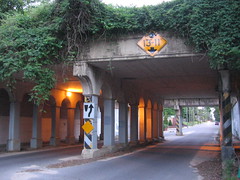A Cliche for the Wrecking Ball
 We're not so far from our annual demarc between Future and Past that I can't sling a cliche back over into auld lang syne:
We're not so far from our annual demarc between Future and Past that I can't sling a cliche back over into auld lang syne:preservationists can't let go of the past.*
In my estimation, people dedicated to saving older buildings are motivated not by a fetish for the Past but by a specific and recent history lesson. The lesson that in America over the last 60 years, we have built bad where we have demolished great. We have destroyed and replaced visually exciting, energy creating buildings with walk-stopping parking lots, energy-draining setbacks and city-killing banality. Not always, of course, but 9 out of 10 times, if not 99 out of 100 times.
 As urbanist James Howard Kunstler put it in this excellent podcast on preservation:
As urbanist James Howard Kunstler put it in this excellent podcast on preservation:we're not capable of putting new things up that are as good as the old things we're losing. It's hard to account for that. We're not really dumber than our great-grandparents and we're certainly a lot richer than they were... But there were forces in our culture and in our economy that have prevented us from putting up buildings that are as worthy or as beloved or as lovable, as worthy of our affection, as these things we're losing.
It didn't have to be that way, but it was. It doesn't have to be that way, but it still is.
Until we can consistently replace good with better, or at least, as-good, many of us will see the approaching bulldozers as tools of regress, coming to wreck our neighborhoods, our districts and our city's Future.
Labels: Commercial Appeal, demolition, historic preservation, Memphis, Stop Demolishing Our Economic Advantage





